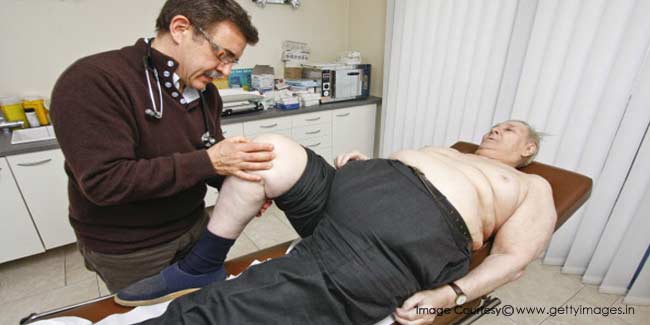
A research has found that obesity plays an important role in causing osteoarthritis (OA), a degenerative joint disorder characterized by pain, decreased mobility and negative impact on quality of life. The study done by Lauren K. King, Lyn March and Ananthila Anandacoomarasamy is named “Obesity & Osteoarthritis” and is published in Indian Council of Medical Research (ICMR).
The study done by Lauren K. King, Lyn March and Ananthila Anandacoomarasamy is named “Obesity & Osteoarthritis” and is published in Indian Council of Medical Research (ICMR).
Obesity is associated with the incidence and progression of OA of both weight-bearing and non weight-bearing joints, to rate of joint replacements as well as operative complications.
The researchers believe that weight loss in OA can impart clinically significant improvements in pain and delay progression of joint structural damage.
World Health Organisation (WHO) estimates from 2008, indicate that more than 1.4 billion adults are overweight and, of these, more than 200 million men and 300 million women are obese. The trend is worrying: over the past 30 years, worldwide obesity has more than doubled and is associated with an elevated risk of an array of chronic diseases. The implications for the musculoskeletal system include both degenerative and inflammatory conditions, with the greatest burden resulting from osteoarthritis (OA).
Currently, nearly 10 per cent of the population is affected by osteoarthritis and the prevalence increases with age. As reported by researcher Coggon, subjects with a BMI>30 kg/m2 were 6.8 times more likely to develop knee OA than normal-weight controls.
Weight loss has been demonstrated to improve both pain and function in obese subjects with knee OA. Recently a research done by Gudbergsen demonstrated that weight loss imparts symptomatic relief in obese subjects with knee OA independently of joint damage severity.
The increasing worldwide prevalence of obesity together with an ageing population has lead to an escalating need for joint replacement surgery. Obesity is also associated with earlier age at hip and knee arthroplasty. In a case–control study from the UK with an 8-year follow up, overweight was not found to be a predictor of poor outcomes of hip replacement surgery.
Read more Health News.
How we keep this article up to date:
We work with experts and keep a close eye on the latest in health and wellness. Whenever there is a new research or helpful information, we update our articles with accurate and useful advice.
Current Version
